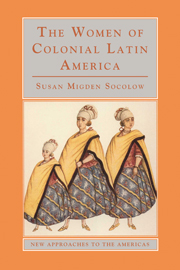Book contents
- Frontmatter
- Contents
- List of Illustrations
- Acknowledgments
- Introduction: Why Women?
- 1 Iberian Women in the Old World and the New
- 2 Before Columbus: Women in Indigenous America and Africa
- 3 Conquest and Colonization
- 4 The Arrival of Iberian Women
- 5 Women, Marriage, and Family
- 6 Elite Women
- 7 The Brides of Christ and Other Religious Women
- 8 Women and Work
- 9 Women and Slavery
- 10 Women and Social Deviance: Crime, Witchcraft, and Rebellion
- 11 Women and Enlightenment Reform
- Conclusion
- Documents
- Suggested Further Reading
- Index
- Plate section
8 - Women and Work
Published online by Cambridge University Press: 05 June 2012
- Frontmatter
- Contents
- List of Illustrations
- Acknowledgments
- Introduction: Why Women?
- 1 Iberian Women in the Old World and the New
- 2 Before Columbus: Women in Indigenous America and Africa
- 3 Conquest and Colonization
- 4 The Arrival of Iberian Women
- 5 Women, Marriage, and Family
- 6 Elite Women
- 7 The Brides of Christ and Other Religious Women
- 8 Women and Work
- 9 Women and Slavery
- 10 Women and Social Deviance: Crime, Witchcraft, and Rebellion
- 11 Women and Enlightenment Reform
- Conclusion
- Documents
- Suggested Further Reading
- Index
- Plate section
Summary
The poor females perform all the drudgery, waiting upon [the men] with the greatest humility.
Colonial women were not only wives, concubines, spinsters, mothers, and nuns; they were also participants in the local colonial economy. Unfortunately the place of women in the economy – as investors, consumers, and above all as a work force – has tended to be ignored by historians. We are just beginning to understand the role played by women. This chapter will look at female participation in various sectors of the colonial economy paying special attention to the importance of social class, ethnicity, and physical location in women's economic pursuits.
Because of their number in colonial Latin America, an active economic role for women is not surprising. By the eighteenth century and possibly before, women were in the majority in virtually all the cities of colonial Latin America. For example, by 1778 in Córdoba, Argentina, 54-8 percent of the population was female; in late eighteenth-century São Paulo (1798), women accounted for 53.3 percent of the total; Quito also became increasingly female and by 1797 had only 53 men per 100 women.
The ratio of women to men differed by place and social or racial category, but from the seventeenth century on, women were in the majority in virtually every urban nonwhite group.
- Type
- Chapter
- Information
- The Women of Colonial Latin America , pp. 112 - 129Publisher: Cambridge University PressPrint publication year: 2000



